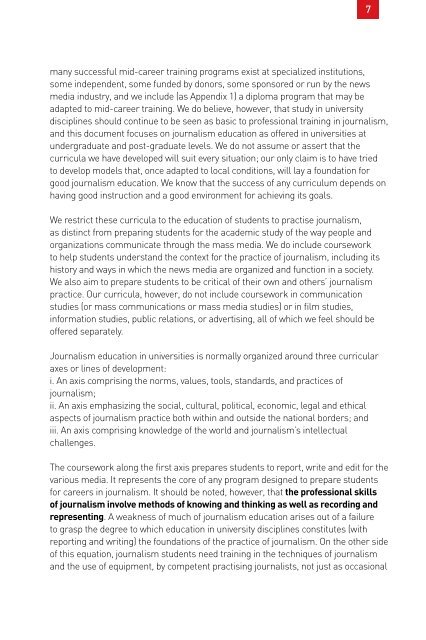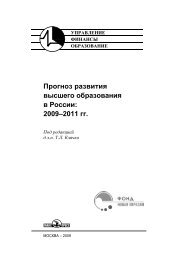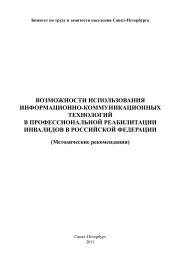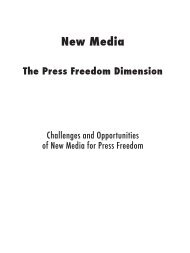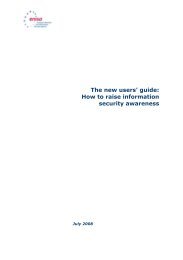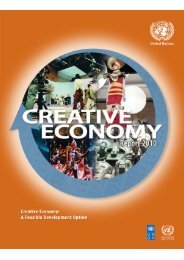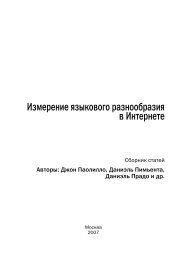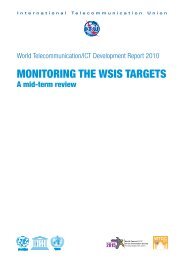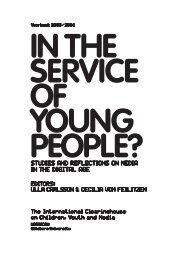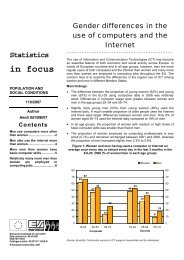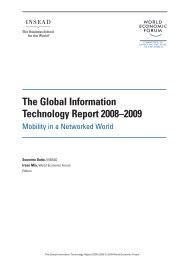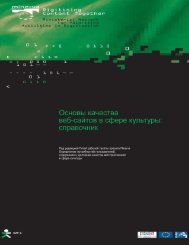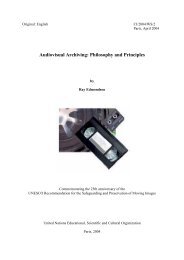Model curricula for journalism education for developing countries ...
Model curricula for journalism education for developing countries ...
Model curricula for journalism education for developing countries ...
You also want an ePaper? Increase the reach of your titles
YUMPU automatically turns print PDFs into web optimized ePapers that Google loves.
many successful mid-career training programs exist at specialized institutions,<br />
some independent, some funded by donors, some sponsored or run by the news<br />
media industry, and we include (as Appendix 1) a diploma program that may be<br />
adapted to mid-career training. We do believe, however, that study in university<br />
disciplines should continue to be seen as basic to professional training in <strong>journalism</strong>,<br />
and this document focuses on <strong>journalism</strong> <strong>education</strong> as offered in universities at<br />
undergraduate and post-graduate levels. We do not assume or assert that the<br />
<strong>curricula</strong> we have developed will suit every situation; our only claim is to have tried<br />
to develop models that, once adapted to local conditions, will lay a foundation <strong>for</strong><br />
good <strong>journalism</strong> <strong>education</strong>. We know that the success of any curriculum depends on<br />
having good instruction and a good environment <strong>for</strong> achieving its goals.<br />
We restrict these <strong>curricula</strong> to the <strong>education</strong> of students to practise <strong>journalism</strong>,<br />
as distinct from preparing students <strong>for</strong> the academic study of the way people and<br />
organizations communicate through the mass media. We do include coursework<br />
to help students understand the context <strong>for</strong> the practice of <strong>journalism</strong>, including its<br />
history and ways in which the news media are organized and function in a society.<br />
We also aim to prepare students to be critical of their own and others’ <strong>journalism</strong><br />
practice. Our <strong>curricula</strong>, however, do not include coursework in communication<br />
studies (or mass communications or mass media studies) or in film studies,<br />
in<strong>for</strong>mation studies, public relations, or advertising, all of which we feel should be<br />
offered separately.<br />
Journalism <strong>education</strong> in universities is normally organized around three <strong>curricula</strong>r<br />
axes or lines of development:<br />
i. An axis comprising the norms, values, tools, standards, and practices of<br />
<strong>journalism</strong>;<br />
ii. An axis emphasizing the social, cultural, political, economic, legal and ethical<br />
aspects of <strong>journalism</strong> practice both within and outside the national borders; and<br />
iii. An axis comprising knowledge of the world and <strong>journalism</strong>’s intellectual<br />
challenges.<br />
The coursework along the first axis prepares students to report, write and edit <strong>for</strong> the<br />
various media. It represents the core of any program designed to prepare students<br />
<strong>for</strong> careers in <strong>journalism</strong>. It should be noted, however, that the professional skills<br />
of <strong>journalism</strong> involve methods of knowing and thinking as well as recording and<br />
representing. A weakness of much of <strong>journalism</strong> <strong>education</strong> arises out of a failure<br />
to grasp the degree to which <strong>education</strong> in university disciplines constitutes (with<br />
reporting and writing) the foundations of the practice of <strong>journalism</strong>. On the other side<br />
of this equation, <strong>journalism</strong> students need training in the techniques of <strong>journalism</strong><br />
and the use of equipment, by competent practising journalists, not just as occasional


